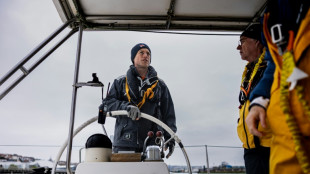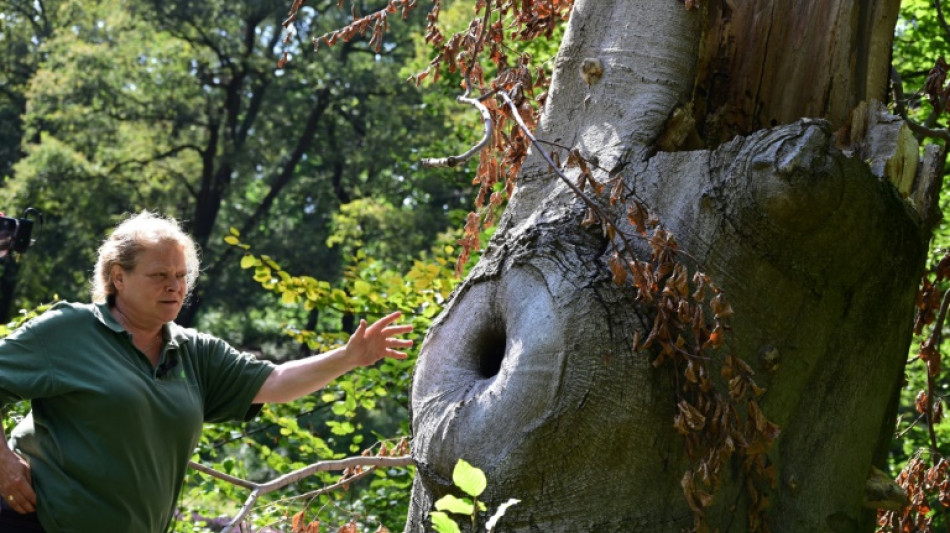
-
 SFWJ / Medcana Announces Strategic Expansion Into Australia With Acquisition of Cannabis Import and Distribution Licenses
SFWJ / Medcana Announces Strategic Expansion Into Australia With Acquisition of Cannabis Import and Distribution Licenses
-
US unveils new port fees for Chinese-linked ships
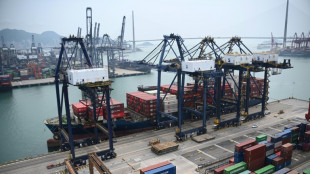
-
 First US 'refugee scientists' to arrive in France in weeks: university
First US 'refugee scientists' to arrive in France in weeks: university
-
Members of UK Jewish group launch broadside on Gaza war

-
 One million Haitian children face 'critical' food shortage: UN
One million Haitian children face 'critical' food shortage: UN
-
Spring snow storm wreaks deadly havoc in the Alps
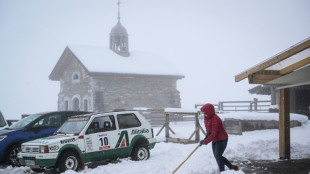
-
 Man Utd buy time to make miserable season 'special', says Amorim
Man Utd buy time to make miserable season 'special', says Amorim
-
Netflix earnings top forecasts despite economic turmoil

-
 Thomas three clear at RBC Heritage after sizzling 61
Thomas three clear at RBC Heritage after sizzling 61
-
Man Utd beat Lyon in Europa League epic, Spurs and Athletic Bilbao reach semis

-
 Frankfurt's Goetze sidelined with leg injury
Frankfurt's Goetze sidelined with leg injury
-
Spurs players 'never lost belief', says Postecoglou

-
 Man Utd stun Lyon in nine-goal Europa League classic to reach semis
Man Utd stun Lyon in nine-goal Europa League classic to reach semis
-
Netflix earnings in first quarter of 2025 top forecasts

-
 Trump says US 'talking' to China on tariffs
Trump says US 'talking' to China on tariffs
-
Salvadoran soldiers stop US senator near prison holding expelled migrant
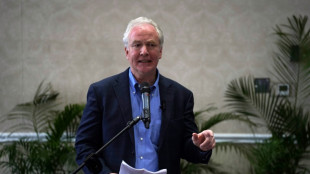
-
 Solanke penalty sends Spurs to Europa League semis
Solanke penalty sends Spurs to Europa League semis
-
CAF crackdown after trouble in African club matches

-
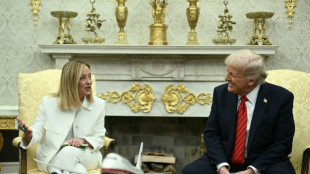 Trump talks up EU tariff deal as Italy's Meloni visits
Trump talks up EU tariff deal as Italy's Meloni visits
-
Trump insists he could fire independent Fed Chair Powell

-
 Google has illegal monopoly in ad tech, US judge rules
Google has illegal monopoly in ad tech, US judge rules
-
Trump softens on Zelensky, says mineral deal coming 'soon'
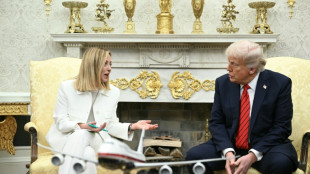
-
 Jacks helps Mumbai beat Hyderabad in IPL
Jacks helps Mumbai beat Hyderabad in IPL
-
Countries must 'make the best' of new multipolar world: IMF chief

-
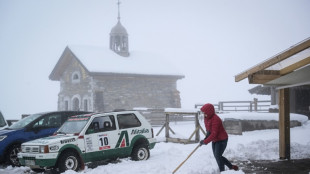 Heavy spring snow storm wreaks havoc in the Alps
Heavy spring snow storm wreaks havoc in the Alps
-
US judge rules against Google in online ad tech antitrust case

-
 Andreeva knocked out by Alexandrova in Stuttgart last 16
Andreeva knocked out by Alexandrova in Stuttgart last 16
-
Iran challenges four countries in UN court over jet it downed in 2020

-
 'Not at 50' - Alonso sets retirement limit
'Not at 50' - Alonso sets retirement limit
-
Macron praises US-European-Ukraine talks as 'important occasion for convergence'

-
 Verstappen dismisses Red Bull exit fears
Verstappen dismisses Red Bull exit fears
-
Italy's Meloni, Trump talk up EU trade deal hopes

-
 'Slow but steady' progress for Martin after Qatar MotoGP crash
'Slow but steady' progress for Martin after Qatar MotoGP crash
-
Pogacar-Van der Poel duel inspires Evenepoel comeback

-
 US judge rules Google monopolized online ad tech market
US judge rules Google monopolized online ad tech market
-
Bearman back at 'special' debut-track Jeddah

-
 Swiss watch exports to US soared ahead of Trump tariffs
Swiss watch exports to US soared ahead of Trump tariffs
-
Alcaraz finds best to reach Barcelona Open quarters

-
 Where are all the aliens?: Fermi's Paradox explained
Where are all the aliens?: Fermi's Paradox explained
-
France full-back Dulin to retire at end of season

-
 World economy likely to avoid recession despite tariffs: IMF chief
World economy likely to avoid recession despite tariffs: IMF chief
-
57 killed in Sudan's Darfur as trapped civilians fear bloodbath

-
 Vietnam ups wind, solar targets as energy demand soars
Vietnam ups wind, solar targets as energy demand soars
-
Pope says doing 'best he can' on jail visit before Easter

-
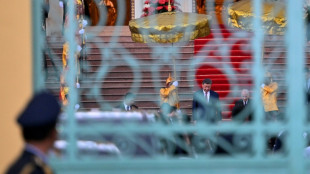 China's Xi meets Cambodian leader as part of regional diplomatic blitz
China's Xi meets Cambodian leader as part of regional diplomatic blitz
-
Ukrainian tennis player seeks legal justice over 'moral abuse'

-
 Italy's Meloni seeks EU tariff deal from Trump
Italy's Meloni seeks EU tariff deal from Trump
-
France's feminist icon Pelicot to sue Paris Match for privacy invasion

-
 World economy should avoid recession despite tariffs, IMF chief says
World economy should avoid recession despite tariffs, IMF chief says
-
Stocks waver as ECB cuts rate, Trump slams Fed chief
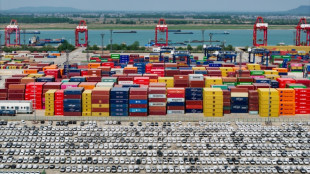

Germany's parks plant a way forward on climate change
In the castle gardens of Muskauer Park, which straddles both banks of the German-Polish river border, caretakers have mounted a fightback against the impacts of climate change.
On the stump of a 150-year-old oak tree, gnawed by parasites and felled in a storm, a tender new shoot represents the estate's hope of adapting to rising temperatures and more frequent droughts.
As part of a "natural regeneration" project, the sapling was grafted onto its fallen predecessor by gardeners in the first step towards replacing the UNESCO-listed park's lost trees.
The young oak "will benefit from the roots of the old tree and will be more resistant to threats", gardener Jana Kretschmer told AFP.
By transmitting their DNA to the new saplings, the older trees "teach" their descendants how to adapt to less hospitable conditions.
"Nature shows the way, humans need only look on," said Kretschmer.
Drought and pests are among the silent killers encouraged by climate change, which weakens plants and has started to decimate the flora of the parklands on both sides of the Neisse river.
Some 180 beeches, ashes and oaks had to be felled there last year.
"Every year since 2018 we have to cut down more and more trees," said Kretschmer, the site's deputy manager, who bemoaned the loss of countless old trees as a "catastrophe".
- Natural cure -
In June, 15 German estates presented their plans to protect their gardens against the impacts of climate change.
At Muskauer Park, the groundskeepers are betting on the traditional method of natural regeneration to increase the tree-count.
Importing more resistant species of trees would be an option, but one that would be "neither sustainable, nor intelligent", said park manager Cord Panning.
A natural regeneration approach moreover promises savings in two scarce commodities: money and water.
Following the method, caretakers select the best young specimens to plant them in place of old trees, eschewing genetic engineering or any foreign transplants.
In time, they hope to restore virtually all of the trees in the 19th century garden that have been lost and felled.
Among the pests to have plagued the trees at Muskauer Park are the tinder fungus and the bark beetle.
"Usually, by the time you realise it, it is too late," said Kretschmer.
Long dry spells between 2018 and 2020 did nothing to help the situation, leaving the trees ever more vulnerable to attack.
- Fungal invasion -
Further south in Germany, at Nymphenburg Palace in Munich, the spread of the phytophthora fungus and invasive mistletoe species are depriving trees of water.
"The trees are experiencing dry stress, even in years where rainfall is sufficient," said Michael Degle, the palace's landscape architect.
The Munich park has had a system of "sustainable tree management" since 2018, which employs moisture sensors and new pruning techniques.
The project feeds into the joint efforts of over a dozen garden estates in Germany, including Muskauer Park, to develop effective responses to climate change.
But their work is "reaching its limits", according to the group's June report.
Already, 20 to 30 percent of their budget is spent on fixing climate damage -- a share which is only increasing.
According to their calculations, somewhere between 200 and 250 million euros ($220 and 275 million) would be needed in the long term to protect historic parks from rising temperatures.
The damage to trees at Muskauer Park by a warming climate will be on show at the estate's open day at the end of September.
An opportunity, according to Kretschmer, to show that trees "are not just wood, but living beings much more clever than us".
L.Miller--AMWN


